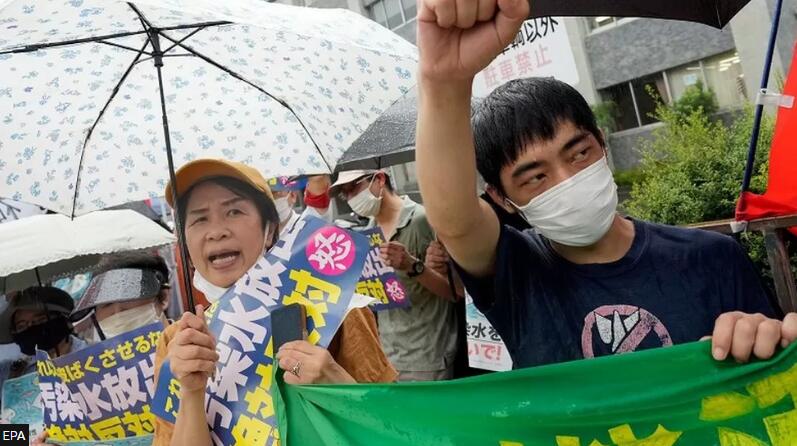
Fukushima nuclear disaster: Japan to release treated water in 48 hours
Japan will start releasing treated radioactive water from the tsunami-hit Fukushima nuclear plant into the Pacific Ocean on Thursday, despite opposition from its neighbours.
The decision comes weeks after the UN’s nuclear watchdog approved the plan.
Some 1.34 million tonnes of water – enough to fill 500 Olympic-size pools – have accumulated since the 2011 tsunami destroyed the plant.
The water will be released over 30 years after being filtered and diluted.
Authorities will request for the plant’s operator to “promptly prepare” for the disposal to start on 24 August if weather and sea conditions are appropriate, Japan’s Prime Minister Fumio Kishida said on Tuesday after a Cabinet meeting.
Mr Kishida had visited the plant on Sunday, prompting speculation the release was imminent.
The government has said that releasing the water is a necessary step in the lengthy and costly process of decommissioning the plant, which sits on the country’s east coast, about 220km (137 miles) north-east of the capital Tokyo.
Japan has been collecting and storing the contaminated water in tanks for more than a decade, but space is running out.
In 2011, a tsunami triggered by a magnitude 9.0 earthquake flooded three reactors of the Fukushima Daiichi Nuclear Power Plant. The event is regarded as the world’s worst nuclear disaster since Chernobyl.
Shortly after, authorities set up an exclusion zone which continued to be expanded as radiation leaked from the plant, forcing more than 150,000 people to evacuate from the area.
The plan to release water from the plant has caused alarm across Asia and the Pacific since it was approved by the Japanese government two years ago.
It was signed off by the UN’s nuclear watchdog in July, with authorities concluding the impact on people and the environment would be negligible.
But many people, including fishermen in the region, fear that discharging the treated water will affect their livelihoods.
A crowd of protesters in Tokyo on Tuesday also staged a rally outside the prime minister’s official residence, urging the government to stop the release.
Plant operators Tepco have been filtering the water to remove more than 60 radioactive substances but the water will not be entirely radiation-free as it will still contain tritium and carbon-14- radioactive isotopes of hydrogen and carbon that cannot be easily removed from water.
But experts have said they are not a danger unless consumed in large quantities, because they emit very low levels of radiation.
“As long as the discharge is carried out as planned, radiation doses to people will be vanishingly small – more than a thousand times less than doses we all get from natural radiation every year,” says Prof Jim Smith, who teaches environmental science at the University of Portsmouth.
Experts also note that the contaminated water is being released into a massive body of water, the Pacific Ocean.
“Anything released from the site will therefore be massively diluted,” says Prof Gerry Thomas, who teaches molecular pathology at the Imperial College London.
Tokyo has previously said the water that will be released into the Pacific Ocean, which has been mixed with seawater, has tritium and carbon 14 levels that meet safety standards.
Nuclear plants around the world regularly release waste water with tritium levels above that of the treated water from Fukushima.
But the plan has caused uproar in neighbouring countries, with China the most vocal opponent. It accused Japan of treating the ocean like its “private sewer.”
Chinese Foreign Ministry Spokesperson Wang Wenbin reiterated Beijing’s objection on Tuesday, adding it would take “necessary measures to safeguard the marine environment, food safety and public health”.
Japan is “putting its own self-interest over the long-term well-being of all humankind” with the release of waste water, Mr Wang said.
Hong Kong said it would “immediately activate” import curbs on some Japanese food products.
Both South Korea and China have already banned fish imports from around Fukushima.
South Korea’s government, however, has endorsed the plan, and has accused protesters of scaremongering.
Comments (0)